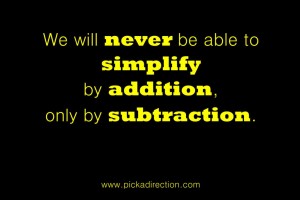As I begin packing for an extended stay in Florida for Christmas, I am reminded of how minimalist my life has become. I am not an avid practitioner of minimalism and I have not gone off the deep end, I just don’t have as much stuff in my life as I used to. But there are some important lessons we can use while making plans in our businesses.
I have an advantage
I’m a guy. We don’t need 4 pairs of shoes for a weekend trip. I can re-wear the same pair of jeans from Friday to Monday and nobody would be able to tell. This usually makes packing very easy for me when I leave, whether it’s for a weekend or week. I learned this from years of traveling for work, I used to constantly over-pack. However, this holiday trip is different.
I have a wedding to go to, church to attend, golf to be played, running to be done (yes, I’m finally fully recovered), and ducks to be hunted. Needless to say, I have a busy stretch ahead of me, and I am in the process of packing for all this. My single roller suitcase is going to turn into a car-full of shoes, suits, golf clubs, and 1/2 of the clothes I own!
Minimalism defined
 When we get used to not having a lot of “fluff” in our lives, we don’t need it. I do my best to live with only the essentials. I try not to buy more clothes than I would wear, I don’t have a brand new car “just because I want it,” and the items I have in my home are functional so I have a little junk as possible. But when I recently moved I realized that I had accumulated more junk than I realized, I had to simplify. I donated 10 bags of cloths & stuff to Goodwill and threw out enough trash to fill an entire garbage truck. I was a stress-relieving process that helped me strip life down to the essentials.
When we get used to not having a lot of “fluff” in our lives, we don’t need it. I do my best to live with only the essentials. I try not to buy more clothes than I would wear, I don’t have a brand new car “just because I want it,” and the items I have in my home are functional so I have a little junk as possible. But when I recently moved I realized that I had accumulated more junk than I realized, I had to simplify. I donated 10 bags of cloths & stuff to Goodwill and threw out enough trash to fill an entire garbage truck. I was a stress-relieving process that helped me strip life down to the essentials.
Minimalism is difficult to define since it’s more of a concept than a concrete thing. Basically, it’s living with only the essentials. Part of the definition I found on Wiki was “not completely without ornamentation, but that all parts, details and joinery (referring to architecture) are considered as reduced to a stage where no one can remove anything further to improve the design.” Although this is an architecture definition, it perfectly captures the idea I am attempting to express.
Application
In art, architecture, our lives , and most importantly for this example, our businesses it helps us to strip away all that is unnecessary and only focus on what we need. I enjoy learning and practicing productivity tips because they are similar in philosophy to a minimalist: nothing is unnecessary.
I get it, you kind of have to be a radical to be a minimalist. Again, I am not one. If I were, this post would be 3 sentences long and this blog would be much less intricate. However, the 2 part application of a minimalist theory to our businesses would help many of us.
1.) Strip away all that is unnecessary –
- Meeting that don’t have a real objective
- Reports that don’t bring any action or have any purpose
- Busy-work (I loathe that term)
- Processes that slow down decision making
2.) Focus on what is most important in the business –
- Is it product design?
- Is it a lean manufacturing process?
- Is it customer service?
- Is it the people we hire?
When we take away the things that aren’t absolutely necessary to us doing business, we can focus on our core competencies and improve them. What can you improve in your business today?
—
Have you recently stripped your business down to the core? Share what the process was like and what you learned.
Leave me a comment or connect with me on Twitter, I’d love to hear your thoughts on stripping down a business.
Have a great weekend!
P.S. 5 Days till Christmas!
